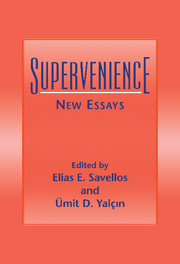Book contents
- Frontmatter
- Contents
- List of Contributors
- Introduction
- Varieties of Supervenience
- Supervenience: Model Theory of Metaphysics?
- “Global” Supervenient Determination: Too Permissive?
- Weak Supervenience Supervenes
- The Tweedledum and Tweedledee of Supervenience
- Reduction in the Mind of God
- Psychophysical Supervenience, Dependency, and Reduction
- Supervenience Redux
- Nonreducible Supervenient Causation
- Physicalism, Supervenience, and Dependence
- An Argument for Strong Supervenience
- Arguments for Supervenience and Physical Realization
- Supervenience and the Essences of Events
- How Does Ontology Supervene on What There Is?
- Supervenience and Intentionality
- Supervenience, Coherence, and Trustworthiness
- Does Truth Supervene on Evidence?
- Index
Supervenience, Coherence, and Trustworthiness
Published online by Cambridge University Press: 29 March 2010
- Frontmatter
- Contents
- List of Contributors
- Introduction
- Varieties of Supervenience
- Supervenience: Model Theory of Metaphysics?
- “Global” Supervenient Determination: Too Permissive?
- Weak Supervenience Supervenes
- The Tweedledum and Tweedledee of Supervenience
- Reduction in the Mind of God
- Psychophysical Supervenience, Dependency, and Reduction
- Supervenience Redux
- Nonreducible Supervenient Causation
- Physicalism, Supervenience, and Dependence
- An Argument for Strong Supervenience
- Arguments for Supervenience and Physical Realization
- Supervenience and the Essences of Events
- How Does Ontology Supervene on What There Is?
- Supervenience and Intentionality
- Supervenience, Coherence, and Trustworthiness
- Does Truth Supervene on Evidence?
- Index
Summary
In this essay, I shall explore the relationship between supervenience and epistemology. There are many theories of supervenience and many theories of epistemology, and that means that it will be extremely difficult to say anything definitive. It is not my aim to explore this subject in a definitive way. My interest in the subject of supervenience and epistemology was aroused by the work of Alston, Van Cleve, and Sosa. They have argued that if epistemic terms supervene on nonepistemic ones, then one argument in favor of coherence theories over foundation theories of justification is undermined. The argument is one to the effect that if the supervenience thesis is correct, then the coherence theorist must sacrifice her primary alleged advantage over any foundation theorist. That advantage is that the coherence theorist can explain why our most fundamental beliefs are justified, namely, because they cohere with some system of beliefs, while the foundation theorist is limited to saying that our basic beliefs are justified without giving any explanation of why. Any explanation of why our basic beliefs are justified would become the basis of an argument to the conclusion that they are justified, and such an argument would render the justification of the beliefs in question nonbasic. The coherence theorist thus claims that the foundation theorist is left with a kind of explanatory surd that the coherence theorist can avoid by explaining justification in terms of coherence.
- Type
- Chapter
- Information
- SupervenienceNew Essays, pp. 293 - 305Publisher: Cambridge University PressPrint publication year: 1995



